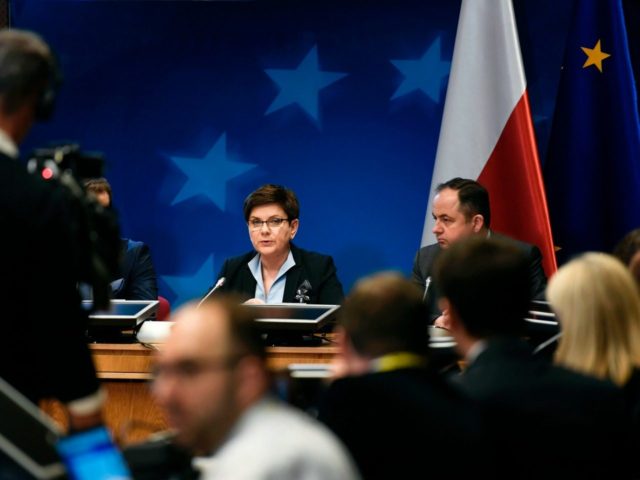(AFP) – EU leaders clashed Friday over plans to build unity in the wake of Brexit, a day after a row with Poland over Donald Tusk’s re-election as the bloc’s president underscored deep divisions.
European heavyweights Germany and France backed a “multi-speed” Europe after Britain’s divorce with the union.
But Polish Prime Minister Beata Szydlo said she would never back such a plan, which is also opposed by some eastern European states that fear being left behind.
The 27 EU leaders — without British Prime Minister Theresa May — struggled to draft a declaration that is to be unveiled at a March 25 summit in Rome to mark the EU’s 60th birthday.
“The motto is that we are united in diversity,” Chancellor Angela Merkel said after the talks in describing what message would carry the day in Rome.
Leaders have stressed the need to pull together as the European Union comes to terms with Britain’s seismic decision to leave the bloc.
The EU 27 will “work together to promote the common good on the understanding that some of us can move closer, further and faster in some areas, keeping the door open to those who want to join later,” said a draft of the Rome proposals.
‘Blackmail’
The wording clearly prioritises a “multi-speed” Europe and drew ire from countries like Poland who are loath to see EU heavyweights go it alone, but also fear for the large subsidies they get from Brussels.
“We disagree with any talk of a multi-speed Europe,” said Polish Prime Minister Beata Szydlo a day after fighting her EU leader counterparts over Tusk.
Szydlo singled out outgoing French President Francois Hollande for criticism, accusing him of trying to “blackmail” Poland at the summit.
“Am I supposed to take seriously the blackmail of a president who has a four percent approval rating and who soon won’t be president?” she said, without giving further details of what Hollande had done.
Tusk, a former Polish premier, backed the drive for unity but also cautioned: “If you want to go fast, go alone, if you want to go far, go together.”
No ‘iron curtain’
European Commission chief Jean-Claude Juncker insisted that any plans to integrate at different speeds after Brexit will not create a “new iron curtain” between east and west.
“This is seen as introducing a new dividing line, a new kind of iron curtain between the east and west. That is not the intention,” Juncker said.
The struggle to forge a more unified future for Europe was overshadowed by the clash with Poland over Tusk’s re-election as head of the European Council, which groups the bloc’s political leaders.
Most of the 28 leaders who gathered on Thursday night — Britain still being present then — had hoped to push through Tusk’s re-election with a minimum of fuss so they could concentrate on the bloc’s future.
Instead, they ran into outright opposition from the staunchly eurosceptic Polish government which cast the only “no” vote against 27 in favour.
Szydlo accused her EU partners of setting a “dangerous precedent” by railroading their pick over the opinion of the candidate’s home government.
Szydlo, whose right-wing eurosceptic Law and Justice party has nursed a long and bitter enmity with the centrist Tusk, blocked the summit’s final statement in response.
“It’s not acceptable that one member says ‘I don’t want that’, and then the other 27 are paralysed,” Luxembourg Prime Minister Xavier Bettel said of the Polish move as he arrived for the talks Friday.
Britain’s May, who left Brussels after the first day of the summit, said she wanted to “get on with” leaving the European Union — and her fellow EU leaders agreed.
The EU summit was May’s last before her self-imposed deadline to trigger the Article 50 withdrawal process by the end of March.
Juncker on Friday said he regretted Britain’s decision but hoped that one day it would return to the EU “boat.”

COMMENTS
Please let us know if you're having issues with commenting.